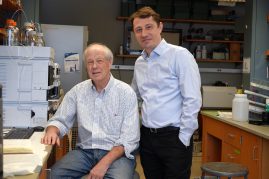John M. Essigmann, PhD

Research Highlights
Understand the relationship between the structures of lesions formed in the genome by DNA damaging agents and the specific biological endpoints of mutation, cancer, and cell death.
Contact
Staff
Research:
The research objective of the Essigmann laboratory is to understand the relationship between the structures of lesions formed in the genome by DNA damaging agents and the specific biological endpoints of mutation, cancer, and cell death. In the area of carcinogenesis, they probe the molecular etiology of human cancer. Their parallel studies on antitumor drugs focus upon uncovering the mechanism of action of existing drugs. Based upon that understanding, the Essigmann laboratory design novel compounds that could be useful for the treatment of cancer.
The work of this laboratory addresses the biochemical mechanisms by which cells respond to specific forms of DNA damage. The rationale of our work stems from the possibility that the DNA adducts caused by DNA damaging agents will be either mutagenic or cytotoxic, or both.
Areas I Research
Biography:
John Essigmann is the William R. (1956) and Betsy P. Leitch Professor in Residence of Chemistry in the MIT Department of Chemistry and Professor of Toxicology and Biological Engineering in the MIT Department of Biological Engineering. He was the Associate Head of the Department of Chemistry until 2012, responsible for graduate and undergraduate education. From 2012 until 2018, he was the director of the MIT Center for Environmental Health Sciences.
Professor Essigmann was brought up in Medford, MA, a suburb of Boston and is a lifelong resident of the Boston area. He went to Northeastern University for his undergraduate degree in chemistry and subsequently earned his Ph.D. from MIT with Professor Gerald Wogan, a pioneer in the field of toxicology.
